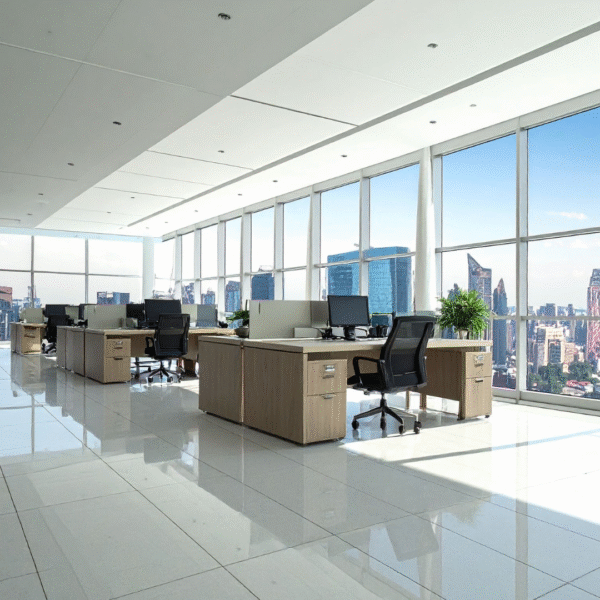London firms are paying billions for office space and empty desks and rooms that literally no one uses.
Each vacant desk is not just idle furniture, it is a drain on growth capital (and often funding from investors). Instead of fuelling hiring or innovation, these costs evaporate in crazy office lease payments. The scale of the problem is city and London-wide, and the numbers are too large to ignore. It’s a crisis.
How much are empty desks really costing companies?
Vacancy rates across London offices hover between 9% and 11%, nearly double the historical average of 5.5%. Each workstation costs on average more than £8,000 a year, based on analysis by Hybrid Hero.
When multiplied across tens of thousands of unused desks, London firms are wasting close to £13 billion annually. This is a huge amount of money lining commercial real estate provider’s pockets, at the expense of growth businesses.
This misalignment is not even theoretical. It hits company balance sheets directly. Meta’s high profile $181 million (£146 million) break payment to exit a central London lease shows how rigid contracts can quickly turn toxic.
With 18 years still left on the agreement, the company chose to take a huge financial hit rather than sit on space it would never fill. This is becoming all too commonplace at every level of the market.
Why does this problem persist?
The dinosaur-like long lease culture of London’s office lease legacy leaves many companies locked into space commitments that no longer fit post pandemic or AI patterns.
The issue is not simply that staff prefer working from home. It is that office supply is still structured for a world where attendance was assumed to be five days a week. With AI, hybrid and everything that’s happened since 2020. That world is gone, yet firms continue to fund it.
- London office vacancy rates stand at 9-11%, nearly twice the long term norm
- Each empty desk costs more than £8,000 annually
- Total wasted spend is estimated at £13 billion a year
- Meta paid $181 million to escape a lease it never used
Companies face a fundamental mismatch between real estate commitments and actual workplace usage, which creates an opening for leaders who can align space with reality.
How can companies realign their office footprint with real usage in the hybrid era?
Research from both Hubble and Hybrid Hero shows many firms need 30 to 40% less workspace than before 2020. Yet a large portion of London occupiers hold onto oversized offices, paying high rents in the hope staff patterns revert. Vacancy remains at its highest level in three decades.
Smart operators are breaking that cycle. Some are consolidating multiple sites into a single hub while others negotiate flexible leases that scale with demand. The shift is driven by cost discipline but also by culture.
Knight Frank’s 2025 market report highlights a polarisation where premium offices with strong design and sustainability credentials remain in demand while lower grade properties struggle to attract tenants.
Only space that delivers utilisation and experience can justify its price.
The evidence of adjustment is visible in leasing activity. Workplace Insight reported a 45% fall in leasing in early 2024, with companies seeking smaller footprints and only committing to quality properties.
Total available office space fell by 1.7 million square feet last year as buildings were repurposed or repositioned to align with this shift.
For forward looking occupiers, this creates an opportunity to right size now and lock in efficiency ahead of the curve.
Those who match their footprint to usage capture immediate savings and can reinvest in growth – which leads to the harder task of executing these changes effectively.
What does effective execution look like in managing unused office space?
Execution begins with clarity. Many firms still base decisions on outdated targets rather than real usage. Attendance data shows a sharp mid week peak while Fridays are consistently quiet, creating a mismatch between contractual obligations and actual demand.
Without honest measurement of who comes in and when, businesses pay premium rents for empty desks that add no value. Flexible and managed is the way forward for many businesses stuck in this rut.

Instead of abrupt cuts, the strongest operators deploy phased strategies. Subletting surplus space tackles immediate waste, while renegotiating lease terms works for firms still testing hybrid routines.
Relocations into smaller, better configured offices have also accelerated, especially as older stock struggles to attract tenants.
However, the risk is moving too aggressively into a smaller footprint only to face capacity pressure when teams do overlap.
- Track weekly and daily attendance patterns rather than relying on assumptions
- Model desk demand around peak days instead of averages
- Explore flexible leases or management agreements that keep options open
- Sublet or reconfigure surplus areas to generate return from unused space
- Avoid reactionary cuts that undermine collaboration once office usage rises
Offices can transform from busy hubs on Wednesdays to near empty floors on Fridays. This uneven flow highlights why fixed seating strategies fall short in a hybrid era.
The firms that close the gap between obligation and use are not simply cutting waste. They are positioning real estate as a living asset that supports long term competitiveness.
Why flexible footprint strategies are winning in London right now
Too many London firms are shackled by oversized, underused offices that swallow growth capital. Long leases, empty desks, and misaligned attendance patterns are creating billions in wasted costs. ADAPT exists to close that gap – helping companies realign their office footprint with how their people actually work.
Instead of committing to rigid, outdated leases, ADAPT provides tailored solutions that scale with genuine workplace demand. From exclusive flexi access to off market spaces to phased relocation and consolidation strategies, ADAPT ensures clients keep flexibility without compromising culture.
Their 360° approach means businesses don’t just secure space – they secure awesome, flex environments built for collaboration, brand identity, and long term adaptability.
With over 20 years of experience navigating London’s complex property market, ADAPT has guided companies of every size through this shift – protecting them from expensive mistakes while unlocking offices that act as strategic growth assets.
The result: reduced waste, stronger culture, and more capital freed for hiring and innovation.
Businesses don’t fail because their desks are empty; they fail because their capital gets trapped in the wrong space and their options lack any flexibility. Our job is to make sure every square foot pays back in growth, culture, and flexibility. Flexible and managed office space is the answer for many in 2025.”
Chris Meredith, ADAPT CEO & Founder
What can you do to get ahead of London’s empty desk problem?
If your offices still reflect pre 2020 headcounts, or if you’re paying for square footage that sits idle, now is the moment to act. The smartest firms are already trimming waste by t aking on new flexible leases and re-investing those savings into real businesses growth in the AI era.
ADAPT helps you secure a workspace that fits how your team works today and adapts as you grow tomorrow. That’s the ADAPT difference. Explore what’s possible with us.






